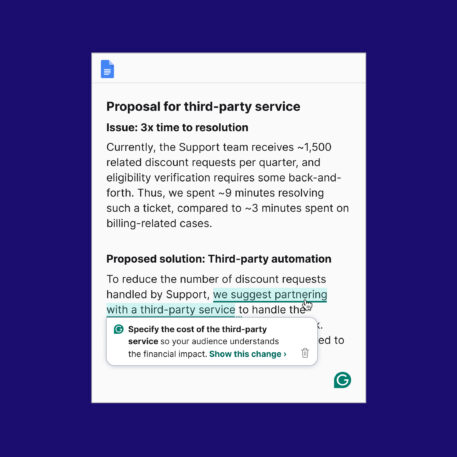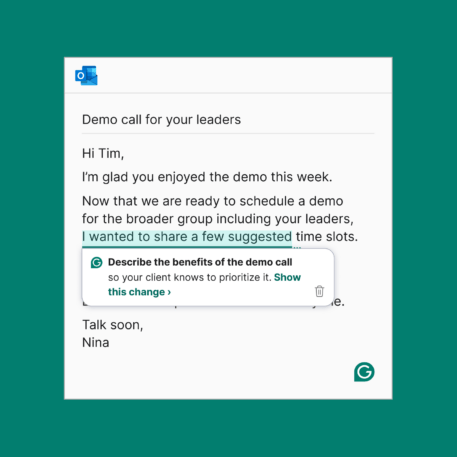A new AI feature from Grammarly can look over your business writing before you hit send, offering “strategic suggestions” designed to make your messages clearer and more impactful.
Whether you’re writing in a Gmail tab, a word processor, or even a chat tool like Slack, the new feature, which is gradually being rolled out to Grammarly’s paid customers, is designed to detect when you’re roughly done with a piece of business writing. Then, Grammarly’s AI can offer tips and suggested rewrites for parts of your writing, like highlighting the most important points in a long message, adding an explicit call to action to a sales email, or remembering to acknowledge your team’s hard work in an internal note.

It’s part of an effort by Grammarly to shift from merely providing spelling, grammar, and overall phrasing suggestions to offering more sophisticated advice based on the content and context of whatever you’re writing. The company has already launched AI features that can draft and edit text on demand based on a prompt. Now, Grammarly has honed large language model AI and other systems to quickly trigger suggestions when appropriate, similar to how writing software might automatically pop up spelling and grammar recommendations. While it’s also possible to ask for writing help from general purpose AI systems like ChatGPT, the Grammarly system is specifically trained around business writing and designed to be used directly within software where people are doing their writing.
“We’re trying to make it just as seamless as possible for people,” says Nick Stanford, group product manager at Grammarly. “No need to develop new habits or anything else.”
In a demonstration, Stanford showed the software offering suggestions for a sample email that could be drafted by a salesperson, including recommendations on how to make the message more persuasive and including specific suggested days and times for a call. As with any other suggestions, users can decide whether or not to follow the recommendations, or continue to make tweaks to the suggested changes.

In the future, it’s possible the AI would be able to access more contextual information, like pulling in calendar information to know when the user would be available for a meeting, Stanford says.
The AI system is trained based on Grammarly’s extensive database of anonymized business writing. Data in the training set is stripped of identifying information and other details to prevent unwitting privacy violations, Stanford says, and built-in safety features keep the AI from offering inappropriate recommendations or helping to refine objectionable pieces of writing. And the AI should only improve as Grammarly learns which of its suggestions users actually accept.
Stanford says he imagines the new strategic suggestions being used in a variety of different contexts, from helping junior employees who are still learning to craft professional communications to reminding busy managers to make sure the key points of their messages stand out. Different customers may have different ways of evaluating whether the suggestions are proving helpful, like whether they boost sales or reduce the need for follow-up emails, and Stanford says Grammarly is primarily concerned with whether they find the tool useful by whatever standard they may use.
“At the end of the day, what we really care about the most is our users’ perception of how much this helps them,” he says.
Autentifică-te pentru a adăuga comentarii
Alte posturi din acest grup

Yahoo’s bet on creator-led content appears to be paying off. Yahoo Creators, the media company’s publishing platform for creators, had its most lucrative month yet in June.
Launched in M

From being the face of memestock mania to going viral for inadvertently stapling the screens of brand-new video game consoles, GameStop is no stranger to infamy.
Last month, during the m

The technology industry has always adored its improbably audacious goals and their associated buzzwords. Meta CEO Mark Zuckerberg is among the most enamored. After all, the name “Meta” is the resi

Even as AI becomes a common workplace tool, its use in

Finding a job is hard right now. To cope, Gen Zers are documenting the reality of unemployment in 2025.
“You look sadder,” one TikTok po

Hiding your address, phone number, and other details is easier than you might think.
